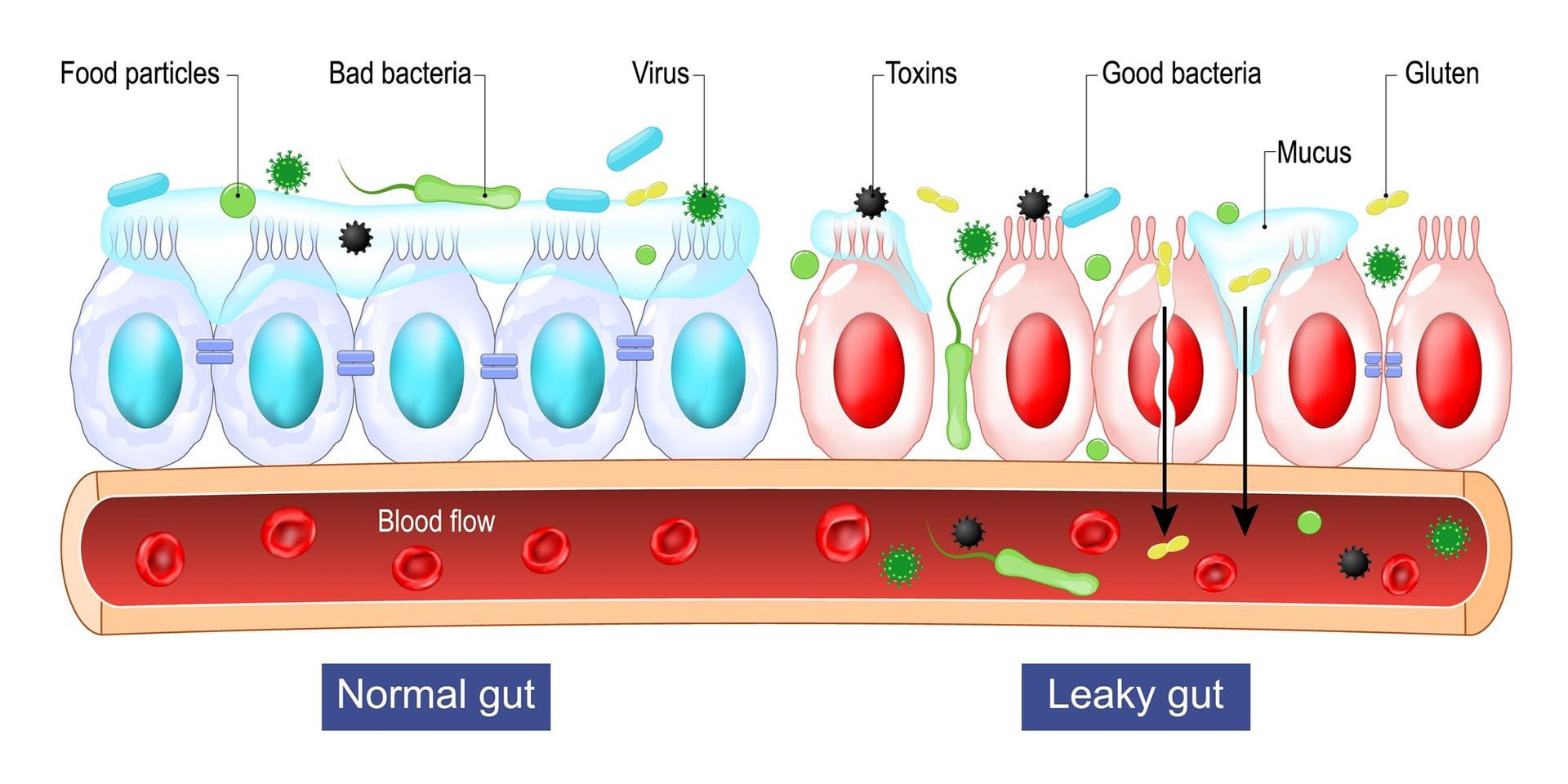Leaky Gut Help - How To Identify, Heal, Rebuild, and Repair Your Leaky Gut
According to the Journal of Diabetes, there is a substantial body of evidence pointing to leaky gut syndrome as a significant cause of autoimmune diseases, including type 1 diabetes. Another problem with a leaky gut is that it can cause malabsorption of vital minerals and nutrients, including zinc, iron, and vitamin B12.
-Dr. Alicia Armitstead
What is Leaky Gut and How to Help it
Unfortunately, the medical term' leaky gut' is precisely what it sounds like. It occurs when the gut lining has holes in it, and waste can spill out into the bloodstream, reaching (and essentially poisoning) your vital organs. This "nightmare scenario" is a reality for a shocking percentage of Americans. Ask yourself if you have experienced any of the following symptoms:
- A bloated belly that just won't go away?
- Extra pounds that are hard to lose?
- Gut discomfort and slow digestion?
- Stiff, achy joints?
- Energy levels that crash too early in the day?
These could be the early signs of a leaky gut. Also, one of the biggest warning signs that you may have a leaky gut is multiple food sensitivities. Partially digested protein and fat can seep through your intestinal lining, enter your bloodstream, and cause an allergic response. This allergic response doesn't mean you'll break out in a rash all over your body, but it can lead to various symptoms:
- Bloating
- Thyroid conditions
- Fatigue
- Joint pain
- Headaches
- Skin issues like rosacea and acne
- Digestive problems
- Weight gain
If left unrepaired, it can lead to more severe health issues like inflammatory bowel disease, IBS, arthritis, eczema, psoriasis, depression, anxiety, migraine headaches, muscle pain, and chronic fatigue. According to the Journal of Diabetes, there is a substantial body of evidence pointing to leaky gut syndrome as a significant cause of autoimmune diseases, including type 1 diabetes. Another problem with a leaky gut is that it can cause malabsorption of vital minerals and nutrients, including zinc, iron, and vitamin B12.
Lectins and Foods That Cause Leaky Gut
Lectins are found in many foods, not just grains, and consumed in smaller amounts, your body will do just fine with them. However, foods that have large amounts of lectins are more problematic. Some lectins and foods that cause leaky gut include wheat, rice, and soy. Sprouting and fermenting grains reduces phytates and lectins, making these foods easier to digest. GMO and hybridized foods tend to be the highest in lectins since they have been modified to fight off bugs. Also, gluten-containing grains may damage your intestinal lining and cause leaky gut syndrome. Once your gut is healthy, you can add back in grains until your body can handle them without causing damage to the intestines.
Conventional cow's milk is another food that can cause a leaky gut. The component of dairy that will harm your gut is the protein A1 casein. Also, the pasteurization process destroys vital enzymes, making sugars like lactose very difficult to digest. For this reason, I only recommend buying raw dairy from A2 cows, goats, sheep, or buffalo. For more information on A2 milk, read here.
Sugar is another substance that will wreak havoc on your digestive system. Sugar will feed the growth of yeast, candida, and bad bacteria, further damaging your gut. Bad bacteria actually create toxins called exotoxins that damage healthy cells and can eat a hole in your intestinal wall.
THE 4-STEP PLAN TO HEAL LEAKY GUT
The good news is there's a solution to successfully healing leaky gut. There is a four-step process that includes:
- REMOVE foods and factors that damage the gut
- REPLACE with healing foods
- REPAIR with specific supplements
- REBALANCE with probiotics
Nutrition Response Testing can specify all four steps to your specific needs. No 4-step plan to heal leaky gut is the same. Everyone needs different supplements to remove different foods from their diet while healing. There are general steps to take that can help before getting muscle tested.
How Gut Flora Complex Works to Support Your Gut Health
Encourages a Healthy Intestinal Environment*
Andrographis has traditionally been used for its bitter action and to support digestion. Oregano essential oil (orally), Phellodendron and Andrographis have been used traditionally to cleanse the lower gastrointestinal tract which helps promote colonization of beneficial intestinal microbiota. Phellodendron contains the important constituent, berberine, which supports cleansing of the lower gastrointestinal tract.
Supports Immune System Health
While intestinal health is important for immune function, a healthy immune system also helps the body keep a healthy balance of intestinal flora. Andrographis has been used traditionally to support a healthy immune system.
Relieves GIT Symptoms & Promotes Bowel Regularity*
Traditionally, Aniseed essential oil is used in Western herbal medicine to help relieve occasional mild gastrointestinal discomfort, due to its carminative actions. Phellodendron is also used traditionally in Chinese medicine to support bowel regularity, with its TCM cooling dry qualities.
The human gastrointestinal tract (mainly the large bowel) is the natural habitat for a large and diverse population of microorganisms known collectively as the intestinal microbiome. Adequate digestive function is required to maintain a healthy microbiome and intestinal environment. Digestive secretions inhibit undesirable microflora and promote an environment that favors the colonization of beneficial microbiota.
In turn, these microbiota benefit the host by supporting digestive function (i.e. metabolizing nutrients for energy), helps in reducing undesirable microflora, and by producing short-chain fatty acids (SCFAs) and other metabolites that help to maintain intestinal health and balance.
A healthy microbiome also supports immune function via the immune-related tissues of the intestine such as the intestinal lymph tissue. If this balance is disrupted – commonly due to poor diet, gastrointestinal upsets or stress – the intestinal environment and subsequent function can become unbalanced. This results in gastrointestinal symptoms such as intestinal bloating, flatulence and discomfort. As such, rebalancing the intestinal environment may help to reduce these symptoms, promote a healthy microbiome and restore optimal digestive function.
How to Repair and Rebuild the Gut
Take a second to think about how hard our body works to keep us alive. It digests our food, keeps our heart beating, helps remove toxins, fights off invaders, and keeps us breathing—just to name a few jobs our body controls. Pretty amazing, right? When you think more about our digestive system, you can look at it simply as a long tube extending from where we place our food to where we eliminate it. It has a job of utmost importance to our health and survival: to nourish and protect.
The health of your digestive system determines what nutrients are absorbed and what toxins, allergens, and microbes are kept out. It is directly linked to the health of the entire body. Intestinal health is defined via the process of optimal digestion, absorption, and assimilation of the food we consume. However, this relies on processes and factors within the body to work together to allow this to take place.
It begins with the bugs that live in our guts. We are home to over 500 different species of microorganisms that create their own ecosystem—I think it is a factory—to allow our food to be digested, regulate hormones, excrete toxins, and produce vital nutrients. You may be thinking, "Bugs? The bad ones?" Yes, we have those, too, but what's key is that the factory stays in balance and all the bugs are doing their correct jobs in the correct location. Too many bad bugs, such as parasites/yeast, and not enough good bugs, such as the lactobacillus and good yeast, can drastically damage your health and cause diseases such as leaky gut, arthritis, eczema, and diabetes. Keeping these in balance is key to health.
Secondly, the gut houses a major filter system, filtering all the toxins we come in contact with. It does this with a very thin filter, which, if abused through the consumption of processed foods and toxins, can actually separate and release toxins into the bloodstream, causing systemic inflammation and intolerances.
Thirdly, the gut is the only human organ that functions without the help of your brain, and it's got 100 million cells. In fact, the gut sends signals to the brain via the Vagus nerve, and you actually send more information from the gut to the brain than from the brain to the gut. In other words, your brain is translating gut signals as emotions. It contributes to those very important happy feelings, and interference can cause anxiety and depression. So, when someone says trust your gut, it might be worth doing.
Lastly, the digestive system breaks down all the food we eat, separating it into what will feed our body and what is waste. The body can only break down whole food to use as fuel, and anything refined or processed is classified as waste. If this process becomes impaired, we no longer create fuel for our body, which causes us to become tired and ill and for inflammation to skyrocket.
Now that we know what needs to work to keep our digestive tract healthy, what do we do if we suffer from digestive issues or health concerns? I am here to help you see the light at the end of the tunnel. The goal is to repair and rebuild.
How To Repair The Gut
- Find the source — Nutrition response testing will help determine the root causes of any nutritional deficiencies your body may be suffering from. Use whole-food nutrition to help detox and rebuild.
- Prioritize relaxation — Finding ways to reduce your level of stress emotionally, physically, and environmentally will reduce inflammation in the body, allowing it to repair. You can use mediation, a favorite hobby, or exercise.
- Reduce toxic exposure - Lower antibiotic use and other medications as these don't just destroy the bad bugs but the whole factory, throwing the gut entirely out of balance.
- Alter your diet — Remove all highly processed food, sugar, highly refined carbohydrates, and alcohol. This will remove a toxic load and allow the body to truly repair.
Now that we have found ways to reduce the stress and toxins in the body to create optimal digestive health, there are many ways to rebuild and create an environment where the factory can start working again.
How To Rebuild The Gut
- Fermented foods — Consuming ½ servings daily of fermented foods will help rebuild the good bacteria. Daily is key; similar to how you would take probiotics regularly to keep the good bugs happy, fermented foods should be consumed the same way.
- The good starchy carbs — Sweet potato, plantains, and cassava are the best starchy carbs for digestion. The good bugs love them, and they won't spike your blood sugar. Some favorites are sauerkraut (Hawthorne Valley), kimchi, kombucha, good quality kefir.
- Deep breathing — Digesting is a parasympathetic process, meaning we must be relaxed for it to occur correctly. Taking three big deep breaths and slowly releasing each time will help the body relax. A prayer blessing your food can also help the body become more relaxed.
- Hydration — Staying hydrated is key to ensuring that nutrients are transported correctly throughout the body and that waste is eliminated.
Now, you can look at your digestive system as your best friend. It's easy to get caught up in how it sometimes doesn't work, causing us pain or discomfort, but understanding that there is a way to help repair and rebuild this intricate friendship within will only help you see that the body truly wants to keep you happy and healthy on the outside, too.












